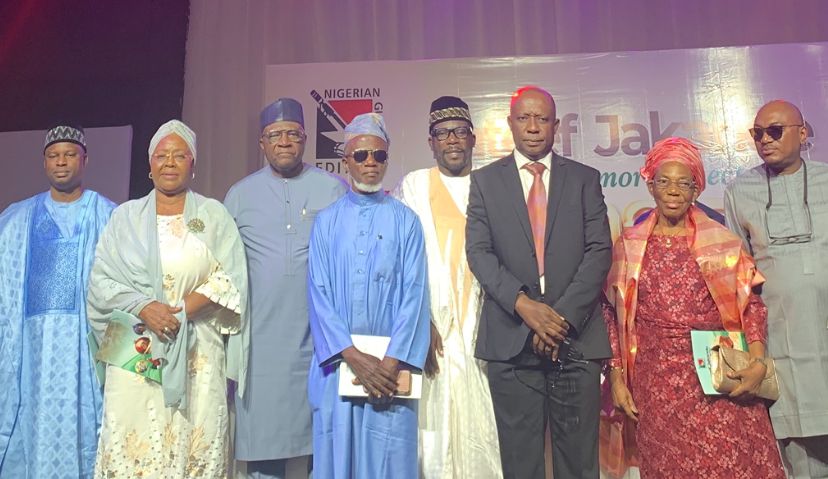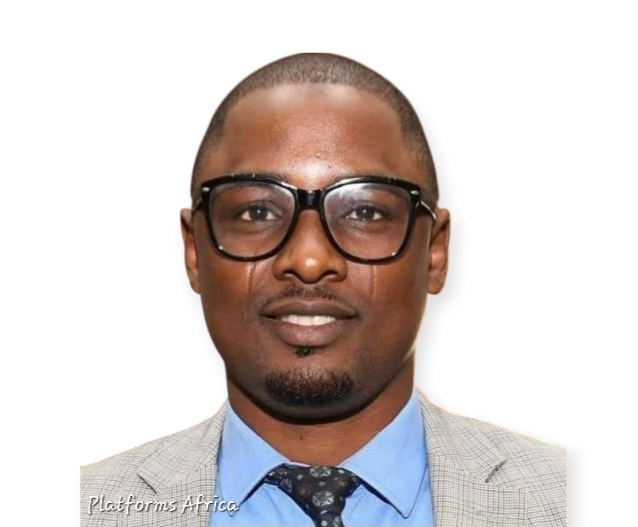The Special Adviser to President Bola Tinubu on Information and Strategy, Mr. Bayo Onanuga, along with the Governors of Bauchi and Lagos States — Senator Bala Mohammed and Mr. Babajide Sanwo-Olu — and other notable Nigerians, have called on media professionals to curb the spread of fake news in order to protect the nation.
Platforms Africa reports that this call was made at the 3rd Lateef Jakande Memorial Lecture organised by the Nigerian Guild of Editors (NGE), with the theme, ‘Journalism and the Challenge of Nation-Building in a Multi-Ethnic Society.’
Platforms Africa reports that the keynote speaker and Governor of Bauchi State, Senator Bala Mohammed; President of the NGE, and Editor of Vanguard Newspapers, Mr Eze Anaba; Special Adviser to the President on Media and Publicity, Mr Bayo Onanuga; former Managing Director and Editor-In-Chief of The Guardian, Mr Emeka Izeze; former Presidential Spokesman, Chief Femi Adesina, were among the dignitaries that graced the well-attended event.
Governor Bala Mohammed, who was represented by Aminu Gamawa, Chief of staff to Bauchi State Governor, explained that the challenge faced by journalists is not only external but also internal, adding that the digital age has opened the floodgates where social media has democratized speech but also diluted truth.
He said, “We must never forget the dark years when newspapers were proscribed, and journalists detained. African Concord (1992), Champion Newspapers and Vanguard (1990), The Guardian (1994), and The Sunday Magazine (1995) — all silenced temporarily, but never conquered. It was a time when pens were confiscated, but not courage. A time when truth was a dangerous act — but it was acted upon, nonetheless.
‘LASU To LAJU,’ Ex-Deputy Gov Wants Lagos Varsity Renamed After Jakande
“Today, the threats are different but no less insidious. The digital age has opened the floodgates of information — and misinformation. Social media has democratized speech but also diluted truth. Artificial intelligence now creates headlines, but who checks the heart behind them?
“And then, there is the corrosive influence of big money. Politicians, corporations, and special interests now compete to own narratives, not just policies. Editorial independence is constantly under siege, and the temptation to trade truth for access is greater than ever.
“Some media houses lack the institutional discipline to be the watchdogs they aspire to be. Young journalists are often exploited, poorly trained, and handed a pen without principles. You cannot promote ethics in society if your own house is in disorder. Journalists must not only write truth — they must live it.
“The veterans must mentor. The institutions must reform. And we must invest in civic education, media literacy, and training that equips the next generation with not just tools — but with a mission.”
He continued, “Indeed, there is hardly any profession better suited to train future public servants than journalism. For the journalist is trained to listen, to investigate, to challenge power, and above all — to serve the public interest.
Over 100 killed’ – Zamfara Residents Protest Rising Insecurity
“That was the philosophy of Alhaji Lateef Jakande. As Governor of Lagos State, his journalistic values became governance values: simplicity, honesty, accessibility, and efficiency. Jakande governed with the pen still in his heart, even if not in his hand.
“Even when he served under General Abacha — a decision that drew sharp criticism and even scorn — he endured it quietly, out of a deep belief in unity, nationhood, and the possibility of service in difficult circumstances. That experience is a reminder to all of us that sometimes, history judges not by the noise of the crowd, but by the integrity of the motive.
“The Nigerian press has endured and resisted oppression in many forms. Under colonialism, it fought for independence. Under military rule, it fought for democracy. Under both, it paid dearly.”
Mohammed advised that journalism should not just be about reporting events but also shape the nation’s soul.
Also speaking at the event, the Minister of Information and National Orientation, Mohammed Idris, represented by Special Adviser to President Bola Tinubu on Information and Strategy, Mr Bayo Onanuga, warned that the nation risks being set ablaze if fake news is unchecked.
‘An Eye For An Eye,’ Family of Slain Rivers Varsity Student Seeks Justice
He slammed those self-proclaimed journalists who operate simply because they possess smartphones and Internet access and warned trained professionals against following such “citizen journalists” in disseminating unverified content.
Idris said, “What we have today is that the media industry is being challenged. We have all kinds of people calling themselves journalists. They have muddled things up.
“As a result, we have many cases of misinformation and disinformation being sent out in the name of being professionals. The Nigerian Guild of Editors must ensure that those who want to practice journalism keep to the rules of engagement.
“There are so many people in our profession who are gatecrashers – who, because they have a smartphone with an Internet connection, you see them sending out news and information, which most of the time is fake news, fake information.
Referencing a recent example, Idris cited the false report that Muhammed Babangida, son of former military president, Gen Ibrahim Babangida (retd.), rejected a government appointment—an account later debunked by Babangida himself.
Scrutiny Mounts on Dapo Segun’s Tenure as NNPC EVP Downstream
“Recently, there was news in the media of the son of Ibrahim Babangida rejecting a government appointment with a letter purportedly written by the young man. It turned out that the young man said he did not write the said letter and that he had actually accepted the appointment and even showed his face in the office.
“Many of us here retweeted, reprinted that lie. There are rules. Don’t always retweet what you find on social media. Most often, they are not correct. If you get any piece of information, check to ascertain its correctness. If it is not correct, don’t use it. Don’t say because somebody has written it, it is the gospel. You need to verify it.
“If you keep writing fake news all over the place, one day, with our pen, we will set our country on fire, because fake news travels a lot and before you retract it, many would have gone ahead to believe what has been said or published by some these unscrupulous people who call themselves journalists, publishers, online.”
Also, Lagos State Governor, Mr Babajide Sanwo-Olu who was represented by the Commissioner for Information and Strategy, Mr Gbenga Omotoso, lamented the influence of social media on the practice of journalism.
“Anybody who has an Android phone and you can press the buttons and send any information to the public without knowing the havoc that it can cause.
NCDMB’s Exec Sec Inspects Training of 305 Youths At Centre For Marine And Offshore
“Our challenge is fake news. I believe our challenges can be addressed. The issue of fake news is now generating threat to journalism.”
In his remarks, Adesina urged the media to maintain its activist stance for a better Nigeria and drive the national consciousness agenda.
He charged the NGE and the Nigerian Union of Journalists to take the lead in correcting wrongs in the industry and upholding professional ethics.
Adesina said, “Nigeria has always been divided and is still divided. If the media must champion national reconciliation, help build a reconciled country, then it must eschew petty sentiments – religion, ethnicity.
“The media fought for independence; fought the military for democracy; and now that we have democracy, we are still fighting to entrench democracy. Nigeria’s media was born into activism, and it must remain activist. And it must not stop activism if we are going to build the kind of country that we desire.”
CBN Retains 27.5% Interest Rate; 8 Banks Meet Recapitalisation Target
On her part, the former NGE President, Mrs. Funke Egbemode, described citizen journalists as “hackers, not professionals,” and called for deliberate efforts to “rescue the pen from irresponsibility.”
She also advocated for stronger training for journalists to prevent further cracks in the profession.
“There is a need to train journalists, in-house, to be professionals. This is imperative as there is a need to rescue the pen from irresponsibility. We must train the next generation not to widen the cracks in the profession,” Egbemode stressed.
Platforms Africa





